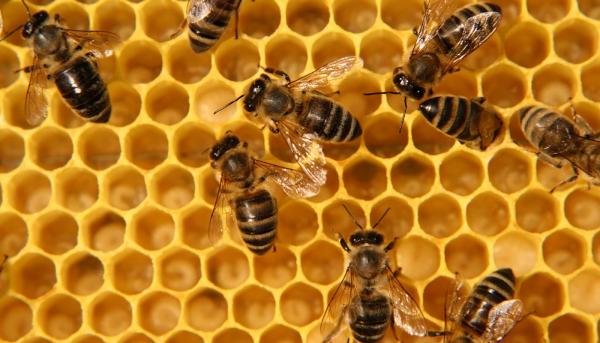Ecological Intelligence

Ecologists tell us that natural systems operate on multiple scales.
At the macro level there are global biogeochemical cycles, like that for the flow of carbon, where shifts in the ratios of elements can be measured not just over the years but over centuries and geologic ages. The ecosystem of a forest balances the entwined interplay of plant, animal, and insect species, down to the bacteria in soil, each finding an ecological niche to exploit, their genes evolving together. At the micro level cycles run their course on a scale of millimeters or microns, in just seconds.
How we perceive and understand all this makes the crucial difference. "The tree which moves some to tears of joy is in the eyes of others only a green thing which stands in the way," wrote the poet William Blake two centuries ago. "Some see Nature all ridicule and deformity, and some scarce see Nature at all. But to the eyes of the man of imagination, Nature is Imagination itself. As a man is, so he sees."
…Ecological intelligence allows us to comprehend systems in all their complexity, as well as the interplay between the natural and man-made worlds. But that understanding demands a vast store of knowledge, one so huge that no single brain can store it all. Each one of us needs the help of others to navigate the complexities of ecological intelligence. We need to collaborate.
Psychologists conventionally view intelligence as residing within an individual. But the ecological abilities we need in order to survive today must be a collective intelligence, one that we learn and master as a species, and that resides in a distributed fashion among far-flung networks of people. The challenges we face are too varied, too subtle, and too complicated to be understood and overcome by a single person; their recognition and solution require intense efforts by a vastly diverse range of experts, businesspeople, activists — by all of us. As a group we need to learn what dangers we face, what their causes are, and how to render them harmless, on the one hand, and, on the other, to see the new opportunities these solutions offer — and we need the collective determination to do all this.
Evolutionary anthropologists recognize the cognitive abilities required for shared intelligence as a distinctly human ability, one that has been crucial to helping our species survive its earliest phases. The most recent addition to the human brain includes our circuitry for social intelligence, which allowed early humans to use complex collaboration to hunt, parent, and survive. Today we need to make the most of these same capacities for sharing cognition to survive a new set of challenges to our survival.
A collective, distributed intelligence spreads awareness, whether among friends or family, within a company, or through an entire culture. Whenever one person grasps part of this complex web of cause and effect and tells others, that insight becomes part of the group memory, to be called on as needed by any single member. Such shared intelligence grows through the contributions of individuals who advance that understanding and spread it among the rest of us. And so we need scouts, explorers who alert us to ecological truths we have either lost touch with or newly discover.
Large organizations embody such a distributed intelligence. In a hospital a lab technician does one set of jobs well, a surgical nurse another, and a radiologist still another; coordinating all these skills and knowledge allows patients to receive sound care. In a company the sales, marketing, finance, and strategic planning departments each represent unique expertise, the parts operating as a whole via a coordinated, shared understanding.
The shared nature of ecological intelligence makes it synergistic with social intelligence, which gives us the capacity to coordinate and harmonize our efforts. The art of working together effectively, as mastered by a star performing team, combines abilities like empathy and perspective taking, candor and cooperation, to create person-to-person links that let information gain added value as it travels. Collaboration and the exchange of information are vital to amassing the essential ecological insights and necessary database that allow us to act for the greater good.
The way insects swarm suggests another sense in which ecological intelligence can be distributed among us. In an ant colony no single ant grasps the big picture or leads the other ants (the queen just lays eggs); instead each ant follows simple rules of thumb that work together in countless ways to achieve self-organizing goals. Ants find the shortest route to a food source with simple hardwired rules such as following the strongest pheromone trail. Swarm intelligence allows a larger goal to be met by having large numbers of actors follow simple principles. None of the actors needs to direct the group's efforts to achieve the overall goal, nor is there any need for a centralized director.
When it comes to our collective ecological goals, the swarm rules might boil down to:
- Know your impacts.
- Favor improvements.
- Share what you learn.
Such a swarm intelligence would result in an ongoing upgrade to our ecological intelligence through mindfulness of the true consequences of what we do and buy, the resolve to change for the better, and the spreading of what we know so others can do the same. If each of us in the human swarm follows those three simple rules, then together we might create a force that improves our human systems. No one of us needs to have a master plan or grasp all the essential knowledge. All of us will be pushing toward a continuous improvement of the human impact on nature.
Signs of the dawning of this shift in collective consciousness are amply visible globally, from executive teams working to make their companies' operations more sustainable to neighborhood activists distributing reusable cloth shopping bags to replace plastic ones — wherever people are engaged in creating a way of interacting with nature that transforms our propensities for short-term trade-offs into a long-term, saner relationship. High-profile investigations into the innumerable dangers human activity poses to our planet's ecosystems, like the growing study of global warming, are a bare beginning. Such efforts help raise our sense of urgency. But we can"t stop there. We need to gather the on-the-ground, detailed, and sophisticated data that can guide our actions. That takes a thorough and ongoing analysis, determined discipline — and the pursuit of ecological intelligence.
Copyright © 2009 by Daniel Goleman
From the book Ecological Intelligence by Daniel Goleman, published by Broadway Books, an imprint of The Crown Publishing Group, a division of Random House, Inc., New York. Reprinted with permission.




